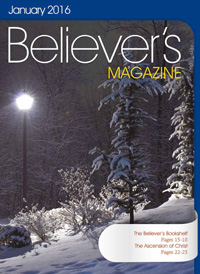What are the idols to which John refers in 1 John 5.21?
This verse is solemn and shows that it is the personal responsibility of each believer to guard himself from idols. The idols here are not merely those of wood, stone or silver. They may include these, but refer also to many things in this world that would fill the heart and distract us from the person of Christ. How many professing Christians have been turned aside and in many cases spiritually ship-wrecked because of making an idol of some person or thing? W E Vine says that the word "idol" is "what is seen; it signifies not only that which would engage the attention of the physical eyesight, to the detriment of the use of our spiritual faculties , but also any false conception which would engross the mind to the obscuring of the vision of faith". These words are good. Let us remember that to a Christian anything is an idol which usurps the place of Christ in the heart.
Let us emphasise the importance of this command. What kind of command is it?
1) It is a final command. Is this the very last command of the Holy Scriptures to be given? Many consider John's Epistles to be the last, but the fact that the command is mentioned last in the First Epistle is significant. It is a fitting end to this epistle and shows the concern of the Apostle John for the Christians he taught. There were many dangers that had risen up in John's day seeking to deceive the heart, but the way to prosper spiritually is to obey this injunction.
2) It is an embracive command. The believers are addressed as "Little children". This is John's term of endearment for all true believers. The expression includes every believer. This is not a command to the fathers, young men and little children of 1 John 2.12-13. There we have the different stages of spiritual growth in the family of God. Here, however, John addresses every believer no matter what spiritual stage they have reached. So that the command given is applicable to all the Lord's people.
3) It is a decisive command. The word "keep" or "guard" signifies that there is to be no hesitation or wavering in responding to the command. It is to be constantly aimed at.
John J Stubbs
Is the "day star" of 2 Peter 1.19 the same as the "morning star" of Revelation 2.28 and 22.16?
First of all, let us consider the context of the reference to the day star in 2 Peter 1.19. Verses 19-21 of the chapter are concerned with the prophetic Scriptures. In the preceding paragraph, we have heard the voice of Peter and also the voice of God the Father: "This is my beloved Son, in whom I am well pleased" (1.17); now we are directed to the voice of prophecy.
So, says Peter, "We have also a more sure word of prophecy" or, "we have the prophetic word made surer" (JND). What Peter and his fellow apostles had seen and heard on the holy mount was a confirmation of what the Old Testament prophets had predicted. Peter adds, "…whereunto ye do well that ye take heed in your hearts" (generally agreed to be a more accurate translation); this is where we are to take heed - not in the mind, the sphere of intellect, but in the heart, the sphere of affection.
Peter continues, "…as unto a light (or lamp, for the night) that shineth in a dark place"; the prophetic Scriptures give illumination as we move in testimony through a scene that is described as a squalid place. However, there is a time limit set: "until the day dawn" - the light will break through the gloom and this will bring an end to the need for a lamp - "and the day star (Gk phosphoros) arise". The reference is to the coming of the Lord, and it should be borne in mind that Peter, in his writings, speaks of the coming of the Lord in a general way.
To the overcomer at Thyatira, Jesus Christ says, "And I will give him the morning star (Gk aster)" (Rev 2.28). Since He identifies Himself in this way in the closing chapter of our Bible, "I am...the bright and morning star" (Rev 22.16), the words of Revelation 2 would also seem to be a reference to Christ - not Himself personally, but to an aspect of Himself that would strengthen the faith of the believers at Thyatira. As the morning star He heralds the dawn of day, as its shining precedes the sunrise.
The present writer would therefore answer the submitted question in the affirmative!
David E West









